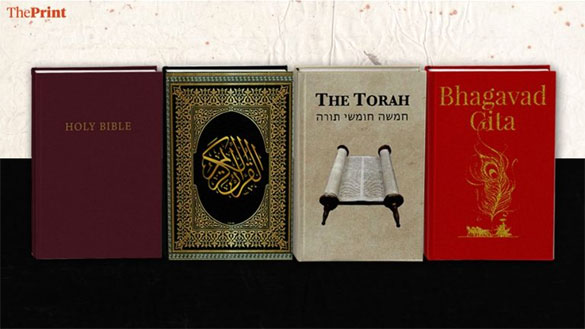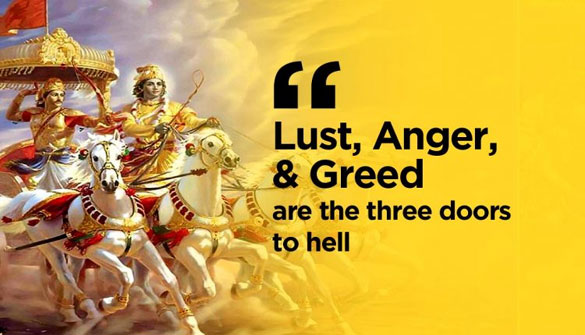Patience – A Divine Virtue Embedded in Islam As Well As All Other Religions of the World

By
Arman Neyazi, New Age Islam
11 June
2021
Islam,
Hinduism, Buddhism, Christianity And Other Religious Faiths’ Definition Of
Practicing Patience And Its Divine Values Have Established It As A Definite Key
To Success
Main
Points:
1. Patience is
a divine virtue that brings a man closer to God
2. Human beings
materialistic approach to life is one of the reasons that patience has gone
into oblivion.
3. Studying
Holy Quran and Hadees traditions, Bhagavad Gita, Christianity, Buddhism and
religious epics of other religions and faiths is important to understand the
ethos of patience.
4. People think
patience is nothing but hiding behind God’s teachings.
------
Patience is
a divine virtue that brings a man closer to God and models him into a rightful
candidate for rewards from God that are everlasting.
Patience is
a trait that the human being takes in good stead, understanding its value in
durable success. But it is also one of those traits that humankind has long
lost to practice. Human beings materialistic approach to life is one of the
reasons that patience has gone into oblivion. Mankind is in a hurry to achieve
all those that he wishes to but without paying attention to the labour and the
amount of time it requires. This act of
being in a hurry creates nothing but a negative sense of inability in one's
mind. And a negative thought creeping in one mind sucks all his ability and
positive sense of success transforming him into a zombie that can only create odds
for society. The human being, therefore, should learn to have patience with the
help of spiritual gurus and reading of religious epics.
Islam,
Hinduism, Buddhism, Christianity and other religious faiths’ definition of
practising patience and its divine values have established it as a definite key
to success that humankind is always in search of.

Illustration: Ramandeep Kaur |
ThePrint
----
Studying
Holy Quran and Hadees traditions, Bhagavad Gita, Christianity, Buddhism and
religious epics of other religions and faiths is important to understand the
ethos of the positivities of life created by practising patience. Consider some
of them in the following lines to understand what does patience mean in
religions that we follow:
Therefore, [O believer,] endure all adversity
with a goodly patience. (Ayah al-Ma`arij - 5) - Muhammad Asad
These negative and positive situations have a
measure — they end after some time. Know this and bear them out with patience. (Bhagavad Gita)
'Enduring patience is the highest austerity (Verse 184 - Dhammapada)
"Through patience, a ruler can be
persuaded, and a gentle tongue can break a bone" (Proverbs 25:14-16, NIV)
Quranic
Teachings To Ascertain the Beauty of Patience
Allah, the
All-Knower knew His people will have to face many such circumstances in the
form of adversity that they will be in danger of losing patience. Losing
patience as described in the Holy Quran is an invitation to long-lasting
difficulties and chaos that engulfs human life and turns it hellish. Therefore,
Allah, the Most Gracious has commanded the living being, on many occasions, to
never lose patience and have faith in Him as He says in the Holy Quran:
God does not burden any soul with more than it
can bear: ...
(Surah Al-Baqarah - 286) — Abdul Haleem
Above
mentioned verse is a clear indication for the human being to have ‘goodly
patience’ فَاصْبِرْ صَبْرًا جَمِيلًا in all adverse situations knowing
that Allah, the Most Gracious has promised not to test him more than his
capacity.
The Holy
Quran describes how even the Prophets and religious scholars were put to test
and how they came out of the adverse situations triumphantly. And it was only
because they never lost faith in Allah and His revelations that teaches to
practice patience. Allah, the All-Knower has revealed in the Holy Quran in the
forms of Ayat that all that is sent on the earth will have to pass through
adverse situations so that they are tested in their faith in God. The good news
for human being is that their perseverance and patience will be rewarded with
guidance, mercy and His kindness.
Consider the following Ayat of the Holy Quran:
...And
be patient and persevering, for Allah is with those who patiently persevere. ( Holy Qur'an, 8: 46)
"All
that is on earth will perish, but face of your Lord will abide (forever), full
of Majesty, Bounty and Honour" (Qur'an Surah Rahman; 55:26-27)
"Give
glad tidings to those who patiently endure, who say when afflicted with a
calamity: "To Allah we belong and to Him we return." They are those
on whom (descend) blessings and mercy from their Lord, and they are the ones
who receive guidance." (Qur'an Surah Baqarah; 2:155-157)
And to
be firm and patient, in pain (or suffering) and adversity, And throughout all
periods of panic. Such are the people of truth, the God-fearing. (Qur'an 2:177)
Indeed,
he who fears Allah and is patient, then indeed, Allah does not allow to be lost
the reward of those who do good.” [Yusuf: 90]
And how
many a prophet [fought and] with him fought many religious scholars. But they
never lost assurance due to what afflicted them in the cause of Allah, nor did
they weaken or submit. And Allah loves the patient ones.” [Surah Aali Imran 3:146]
“For
those who do good in this world is good and the earth of Allah is vast. Only
those who are patient will be paid back their reward without measure.” [az-Zumar 39: 10]
“And We
will surely test you with something of fear and hunger and a loss of wealth and
lives and fruits, but give good tidings to the patient” (Surah Baqarah Ayah 155)
Hadees
Traditions In Appreciation of Patience
Prophet
Muhammad Pbuh lived an exemplary life to establish all the positivities of life
and to make sure that his Ummah also lives as he did. He faced many adversaries
during his lifetime.
But he
never lost his patience and accepted all that came in his life trying to come
out of the adverse situations, with his patience and his belief in Allah. He
was sent on this planet earth as ‘peace for the world’ in the true sense of the
epithet. He kept his companions and common men teaching the religious and
social values of life. His teachings on patience are as under:
"O
Allah! Reward me in my calamity and replace my loss with a better one."
(Sahih Muslim)
The Prophet said, "The real patience is
at the first stroke of a calamity." [Hadith No: 389, Sahih Bukhari]
The
Messenger of Allah (P.B.U.H) said: "The believer who mixes with people and
bears their annoyance with patience will have a greater reward than the
believer who does not mix with people and does not put up with their annoyance"
[Hadith No: 4032, Sunan Ibn Majah].
Narrated
Abu Said Al Khudri: Some Ansari persons asked for (something) from Allah’s
Apostle and he gave them. They again asked him for (something) and he again
gave them. And then they asked him and he gave them again till all that was
with him finished. And then he said “If I had anything, I would not keep it
away from you. (Remember,) whoever abstains from asking others, Allah will make
him contented, and whoever tries to make himself self-sufficient, Allah will make
him self-sufficient. And whoever remains patient, Allah will make him patient.
Nobody can be given a blessing better and greater than patience.” Sahih
Al-Bukhari – Book 24 Hadith 548
The Prophet
(peace be upon him) passed by a woman who was weeping beside a grave. He told
her to fear Allah and be patient. She said to him, “Go away, for you have not
been afflicted with a calamity like mine.” And she did not recognize him. Then
she was informed that he was the Prophet. So she went to the house of the Prophet
(peace be upon him) and there she did not find any guard. Then she said to him,
“I did not recognize you.” He said, “Verily, the patience is at the first
stroke of a calamity” [Sahih Al-Bukhari – Book 23 Hadith 372].
Narrated
Abu Huraira: Allah’s Apostle said, “The example of a believer is that of a
fresh tender plant; from whatever direction the wind comes, it bends it, but
when the wind becomes quiet, it becomes straight again. Similarly, a believer
is afflicted with calamities (but he remains patient till Allah removes his
difficulties.) And an impious wicked person is like a pine tree which keeps
hard and straight till Allah cuts (breaks) it down when He wishes” [Sahih
Al-Bukhari – Book 70 Hadith 547].
Narrated
Ata bin Abi Rabah: Ibn ‘Abbas said to me, “Shall I show you a woman of the
people of Paradise?” I said, “Yes.” He said, “This black lady came to the
Prophet (peace be upon him) and said, ‘I get attacks of epilepsy and my body
becomes uncovered; please invoke Allah for me.’ The Prophet (peace be upon him)
said (to her), ‘If you wish, be patient and you will have (enter) Paradise; and
if you wish, I will invoke Allah to cure you.’ She said, ‘I will remain
patient,’ and added, ‘but I become uncovered, so please invoke Allah for me
that I may not become uncovered.’ So he invoked Allah for her” [Sahih
Al-Bukhari – Book 70 Hadith 555].
Narrated
Anas bin Malik: I heard Allah’s Apostle saying, “Allah said, ‘If I deprive my
slave of his two beloved things (i.e., his eyes) and he remains patient, I will
let him enter Paradise in compensation for them” [Sahih Al-Bukhari – Book 70
Hadith 557].
Narrated
Samurah ibn Jundub: The Prophet (peace be upon him) named our cavalry “the
Cavalry of Allah,” when we were struck with panic, and when panic overtook us,
the Apostle of Allah (peace be upon him) commanded us to be united, to have
patience and perseverance; and to be so when we fought” [Sunan of Abu-Dawood –
Book 14 Hadith 2554].
Narrated
Aisha: I asked Allah’s Apostle about the plague. He said, “That was a means of
torture which Allah used to send upon whomsoever He wished, but He made it a
source of mercy for the believers, for anyone who is residing in a town in
which this disease is present, and remains there and does not leave that town,
but has patience and hopes for Allah’s reward, and knows that nothing will
befall him except what Allah has written for him, then he will get such reward
as that of a martyr” [Sahih Al-Bukhari – Book 7 Hadith 616]
"Indeed!
Whatever Allah gives or takes belongs to him and everything is predestined by
Him." (Sahih Bukhari & Sahih Muslim)
Value of
Patience and Its Appeal
The world
recognises the importance of preserving patience through its religious texts
and the sayings of Sufis and Rishis and faith leaders, believing in the power
of spirituality. The universality of the importance of preserving patience can
be gauged from the fact that all the world religions advocate the perseverance
of patience in all situations, social or natural. Consider what Buddhism,
Hinduism and Christianity have to say about patience:
Buddhism
In
Buddhism, patience refers to not returning harm, rather than merely enduring a
difficult situation. It is the ability to control one's emotions even when
being criticized or attacked. (Alexander Berzin, The Ten Perfections in
Theravada)
'Enduring patience is the highest austerity.
(Verse 184 of the Dhammapada)

(Photo: Courtesy Scroll Droll)
-----
Hinduism
These
negative and positive situations have a measure — they end after some time.
Know this and bear them out with patience. (Bhagavad Gita)
The one,
who doesn’t get upset at the experience of good and bad, is fit to receive
undying motivational energy. The patient receives this energy. (Bhagavad Gita)
Christianity
In the
Christian Bible, patience is referred to in several sections. The Book of
Proverbs notes that
"Through
patience, a ruler can be persuaded, and a gentle tongue can break a bone"
(Proverbs 25:14-16, NIV)
"End
of a matter is better than its beginning, and patience is better than
pride" (Ecclesiastes 7:7-9, NIV)
"Be
patient with all. See that no one returns evil for evil; rather, always seek
what is good for each other and for all" (Thessalonians 5:14-15, NAB)
"See
how the farmer waits for the precious fruit of the earth,...until it receives
the early and the late rains." (James 5:7-11, NAB)
"Jesus
might display his unlimited patience as an example for those who would believe
in him and receive eternal life".(Timothy 1:15-17 NIV)
Kabir
and Osho on Patience
Kabir
'Have
patience O mind, everything will happen with time, just as a gardener waters a
hundred times, and the fruits come when the season arrives. (Ibn Qayyim’s “Patience and Gratitude”)
Osho
Everything
comes in its own time. Everything comes when you are ripe. Everything comes
when you deserve it .... this is my experience. (Metamorphosise. Blog Spot)
Patience
is a Strength Not a Show of Weakness
Today the
world is in a phase of social and political turbulence and chaos. It is
man-made. It is the result of impatience and a race of superiority in the quest
for materialistic comfort. The human being is living a life full of
exaggerations that demand them to acquire as much as they can and that also in
no time. There is no time for patience. Patience is taken as a weakness. People
think patience is nothing but hiding behind God’s teachings.
In Islamic
and other world religions parlance, patience is the key to durable peace and
growth of spirituality in the society and a source of rewards from the Creator
of the universe. Think, if the Creator of the Universe, by whatever name you
call it, Allah, Bhagwan, Christ, Buddha, Mahavira or anything else, gets
impatient with our wrongdoings and decides to teach the world a lesson. Nothing
will be there but devastations and a few noble souls. We, therefore, remember
Him in our Dua as:
رَبَّنَا أَفْرِغْ عَلَيْنَا صَبْرًا
...O our Lord, pour out patience upon us, .... (Surah Al-A'raf - 126) — Mufti Taqi
Usmani
And
Allah Knows the Best
----
Arman
Neyazi is a columnist with NewAgeIslam.com.
URL: https://www.newageislam.com/interfaith-dialogue/divine-virtue-patience-religion/d/124964
New Age Islam, Islam Online, Islamic
Website, African Muslim News, Arab World News, South Asia News, Indian Muslim News, World Muslim News, Women in Islam, Islamic Feminism, Arab Women, Women In Arab, Islamophobia in America, Muslim Women in West, Islam Women and Feminism
